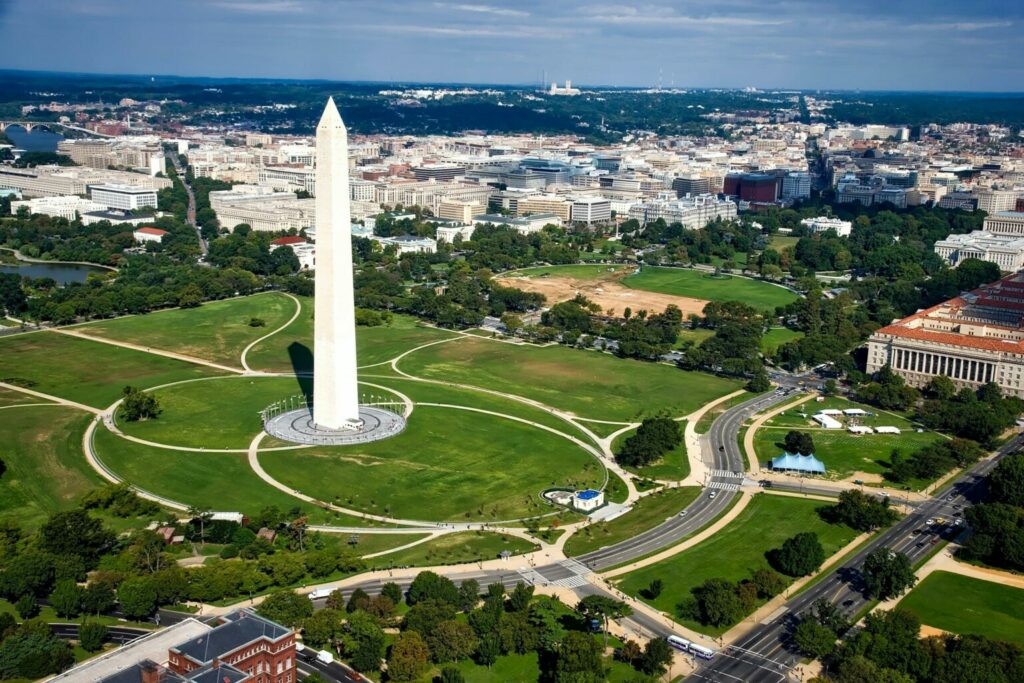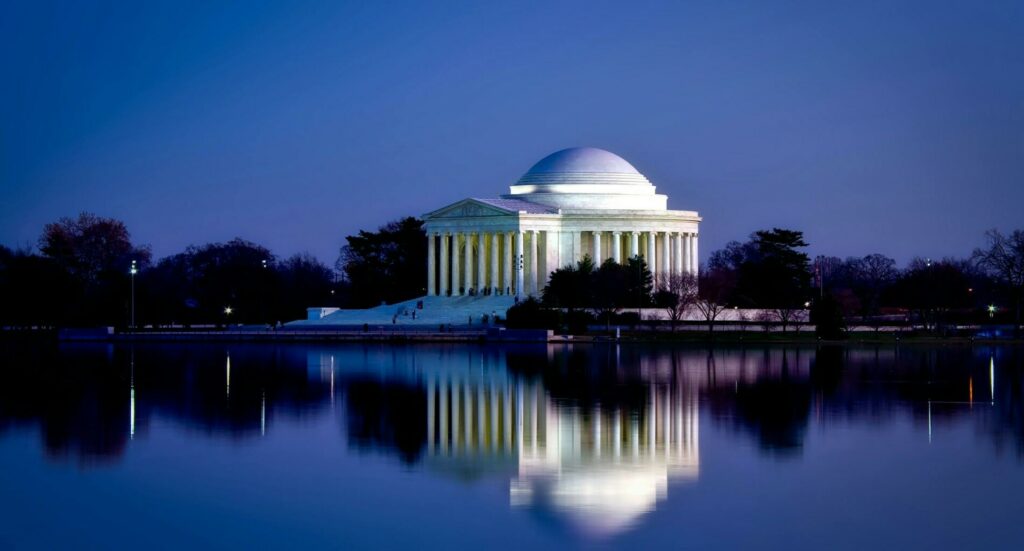Washington, D.C., frequently called the District, is home to the US Government. D.C. has the country’s fifth-largest GDP, making it a lucrative market. However, D.C. is not considered to be very business-friendly due to regulations, high costs, taxes, and bureaucracy, including licensing and permits.
Despite these challenges, Washington, D.C., has a robust economy. In addition to government, it has technology, healthcare, education, and professional services. This guide will give you the information you need to start a business in DC.

Key Takeaways
- The District’s GDP in 2015 was worth $122.5 billion, and according to the World Bank, it has surpassed the GDP of the nation of Hungary. Sectors that majorly contributed to such growth were government, professional services, and real estate.
- The District’s economy is driven by the Federal Government and its Contractors, and the Professional Services, Tech companies, Hospitality and Tourism, Retail, Real Estate and Construction, Higher Education, Healthcare, and professional and legal services all rely on the government and supporting government employees and contractors.
- DC has a skilled, innovative, and creative workforce, including media and communications, professional services, performing arts, culinary arts, visual arts, architecture, and building arts, and museums and heritage make up 58.5 percent of the District’s workforce.
Is Washington, D.C., a Good Place to Start a Business?
Washington, D.C., is generally not considered one of the most business-friendly cities in the United States. While it is home to many federal government agencies, international organizations, and a diverse economy, there are several factors that can impact its reputation as a business-friendly city:
- Regulations: Washington, D.C., is known for having strict and complex regulations, which can pose challenges for businesses, particularly small and medium-sized enterprises.
- High Costs: The cost of living and doing business in Washington, D.C., is relatively high compared to many other cities, which can impact business operations, especially for startups and small businesses.
- Taxes: While D.C. doesn’t have its own state income tax, it does impose corporate and individual income taxes that can affect businesses and residents.
- Bureaucracy: Given its role as the capital and hub of government activity, bureaucratic processes can sometimes be cumbersome and time-consuming for businesses.
- Licensing and Permits: Obtaining business licenses and permits in D.C. can be intricate and time-consuming due to the city’s regulatory environment.
Despite these challenges, it can still be lucrative to start a business in DC. The city still has a robust economy with various industries, including government, technology, healthcare, education, and professional services. It offers proximity to federal agencies, international organizations, and policy-making institutions, which can present unique business opportunities for certain sectors.
Start a Business in DC
In order to start a business in DC, you’ll need a Basic Business License (BBL). All businesses must take the following four simple steps to obtain a (BBL) in DC:
- Name Registration – any corporate entity needs to register the business name on CorpOnline.
- Obtain an EIN – to register a business, you must obtain a federal Employer Identification Number (EIN) and register it with the DC Office of Tax (OTR).
- Register with the Office of the Zoning Administrator – If your business is physically present in the district, then you must get your physical business location approved. This also applies to individuals operating a business out of their homes.
- Apply for a Basic Business License – Once you’ve collected all the necessary documentation to apply, you can submit your BBL application at My DC Business Center.
Since a large portion of businesses in DC work with the government, we’ve also included instructions on how to get approved to work with the DC government. The Office of Contracting and Procurement (OCP) mandates that all businesses follow the below steps in order to do business with the DC government.
- Attend a General Vendor Workshop.
- Meet all of the requirements for doing business with the District.
- Register to do business with the District in eSourcing to receive notice of open solicitations.
- Become a Certified Business Enterprise (CBE) (local businesses only).
- Get on the DC Supply Schedule (CBEs only).
- Regularly visit ocp.dc.gov to view current procurement opportunities.
- Learn more about the types of contracts.
Note that you do not need to complete the above steps if you are not planning on working with the DC government.
Is There Corporate Income Tax in Washington, DC?
Washington, DC, does not impose corporate or personal income tax. Washington, DC, is not a state; therefore, it has no representation in the Federal government. It is the capital of the United States and home to many federal institutions, including the US Treasury. One of the reasons D.C. may not have tax is that the US Constitution forbids “taxation without representation.”
Other Corporate Income Taxes in Washington, D.C.
While there may not be a corporate income tax in DC, there are other taxes that you should be aware of when you start a business in DC.
Business and Occupation (B&O) Tax
B&O is a gross receipt tax measured on the value of products, gross proceeds of the sale, or gross income of the business. The rate corresponds to the classification of the business. You may click here to check the list of B&O tax rates. If unsure of the business classification, you may click here or here to know your business classification.
Retail Sales/Use Tax
Businesses making retail sales in DC collects sales tax from customers. This tax is said to be the principal tax source of the state. Retail sales are generally sales of tangible personal property. Some other sales subject to retail sales tax are sales of services, including but not limited to
- Installation,
- Repair,
- Cleaning,
- Altering,
- Sale of digital products.
Use tax takes effect when sales tax has not been paid. It is imposed on the use of goods or certain services in DC. Use tax is imposed when goods are purchased in another state that does not impose a sales tax or a state with a sales tax lower than DC.
Some other instances of use tax are when there are purchases of goods from individuals not authorized to collect sales tax or when state subscription (mainly through the internet and the said company does not collect sales tax) is subject to use tax. In addition, the purchase of personal property by means of purchasing real property tax is also subject to use tax.

DC Business Franchise Taxes
DC imposes a tax on franchises operating in the District. The franchise tax is assessed as either a corporate franchise tax or an unincorporated business franchise tax.
Corporate Franchise Tax
It is based on the DC gross receipt with a minimum tax of $250 for $1 million or less of the DC gross receipt and $1 million if more than $1 million. The current tax rate is 8.25 percent as of 2022.
Unincorporated Business Franchise Tax
The net income of unincorporated businesses on a combined reporting basis with gross receipts of more than $12,000. A 30% salary allowance for owners and a $5,000 exemption are deductible from the net income to arrive at taxable income.
A business is exempt if more than 80 percent of gross income is derived from personal services rendered by the members of the entity and capital is not a material income-producing factor. A trade, business, or professional organization that, by law, customs, or ethics, cannot be incorporated is exempt.
It is based on the DC gross receipt with a minimum tax of $250 for $1 million or less of the DC gross receipt and $1 million if more than $1 million. The current tax rate is 8.25 percent as of 2022.
Tax Nexus in Washington, DC
Tax Nexus is the minimum threshold of activity that a business can have within a state or municipality before having to pay taxes to the local government.
In DC, businesses must register to report B&O tax/ and collect/submit applicable sales tax if the business meets any of the following thresholds in the current or prior year, starting January 1st, 2020.
- Has physical presence nexus in DC.
- Has more than $100,000 in combined gross receipts sourced or attributed to DC.
- Is organized or commercially domiciled in DC.
FAQs regarding tax nexus in Washington, DC
Since DC is not a state, there can be a lot of questions surrounding tax nexus in the district. Below are some of the commonly asked questions about tax nexus in DC.
Does having a mailing address in the District trigger business tax requirements?
Having a mailing address in Washington, DC, does not indicate if the business must file for B&O Tax and related sales/use tax. However, if the business satisfies one of the indications of Physical Presence Nexus, the business may have to file for the DC taxes it qualifies for.
If my business is in Washington, DC, but I live in a different state, do I need to pay DC taxes?
This depends on the specific situation of the company, as long as it satisfies one of the 3 major bases to file for DC business taxes. Kindly refer to Nexus above.
If all my activities are outside the US and I live in a different country but have a company in Washington, DC, do I have to pay tax there?
If the company is organized or commercially domiciled in DC, then the company may have to file for related business taxes.
Does having an employee in Washington, DC, trigger corporate income tax?
If your business has an employee working in DC, then it will trigger corporate income taxes in DC.
Does having an independent contractor in Washington, DC, trigger corporate income tax?
If the sale of goods or services is derived in the DC, and the activity of the business is significantly associated with establishing or maintaining a market in the state, then having an independent contractor in DC will trigger corporate income tax.
Does having a founder living in Washington, DC, trigger corporate income tax?
The location of a founder’s residence will not impact the business’s taxes if the business is not active in DC. Please note that taxation in DC is based on the value of goods, sales, and gross income of the business.
If you hold board meetings in Washington, DC, will it trigger corporate income tax?
Simply holding a board meeting in DC will not trigger corporate income tax unless the purpose of the meeting is to establish a market in DC.
Does Washington, DC, collect sales tax?
Yes, DC collects sales tax or use tax depending on the services or goods that your business is offering.
Does Washington, DC, tax SaaS income or remote software sales?
The sale of Software as a Service (SaaS) and other digital products is generally subject to DC sales tax.
Does Washington, DC, tax online marketplaces?
Yes, if the online marketplace collects sales tax. If not, use tax is imposed on goods/ services for unpaid sales tax.

How Do I Close a Business in DC?
Dissolving a business is never an easy decision; however, when you do decide to close your DC business, it’s important to do so accurately. Failing to follow the correct steps can leave you open to legal complications and additional unwanted fees.
Follow the simple steps below to close your DC business:
- Value your business – you’ll need to know what your business is worth for dissolution. It can be difficult to do so impartially, and therefore, it may be worth hiring someone to give your business a fair valuation.
- Compile business debts – you’ll need a list of all outstanding debts when filing your dissolution document. It’s important to list all debts, or you, as the owner, could be personally liable for the debts.
- Determine dissolution document – there are two dissolution documents to choose from in DC. Corporations should use Form DBU-7, and LLCs should use Form DLC-8.
- Cancel Basic Business License (BBL) – In order to operate a business in DC, your business most likely had to obtain a BBL. Before filing for dissolution, you should cancel your BBL and any other permits or registrations associated with your business.
- Wrap-up Legal and Financial Obligations – Ensure that all of your business’s financial and legal obligations are settled before filing for dissolution. This includes filing your final tax return, notifying and settling debt with creditors, resolving any tax obligations, and distributing remaining business assets.
- File Dissolution Document – The final step in closing your business is filing the appropriate dissolution document.
Can Cleer help me with my Washington, DC tax filings?
Absolutely! CLEER offers consultations to discuss the best structure for your startup business, no matter what state you register in. We also offer a new company package that includes a tax consultation, bookkeeping, and a chart of accounts set up to help you do it right from the start. We also offer federal income tax preparation, which includes your state tax. We also offer all-in-one monthly accounting packages that include monthly statements plus your Federal and state tax returns.
For additional questions or help, email us at hello@cleer.tax.





